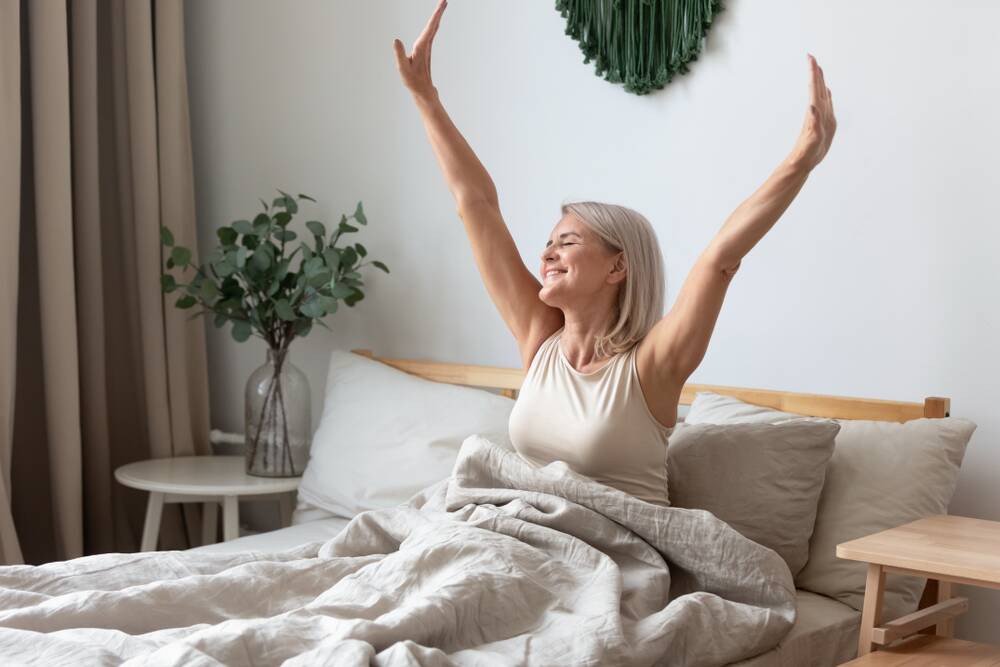Healthy bedroom design: How to create a better sleep space

This is branded content.
According to government studies in 2018, 39.8 per cent of Australian adults experience inadequate sleep in some form.
Whilst this comes from a large number of potential factors, including lifestyle and health status, it shows just how widespread the issue of sleeplessness has become in recent years.
It's quite safe to assume that many of us don't know what it feels like to be well-rested, as hectic schedules and poor sleeping conditions can lead to the symptoms of mild sleep deprivation becoming a simple reality of day-to-day life.
Whilst some will find it more difficult than others to remedy these issues, there are things we can do to provide ourselves with a far better chance at rest and relaxation.
From finding the best mattress for bad backs to exploring blockout curtain options to avoid light disturbance, there is a number of things you can do to improve your overall sleep quality and experience.
So, today we're going to take a quick look at the possibilities available to those that want to update their sleep space and create a healthier bedroom experience.
More than mood lighting
As everyone has likely heard at this point, light pollution and artificial lighting aren't fantastic for our sleep patterns.
The human body is highly light sensitive in terms of how it processes information, and so if you're keeping bright lights on throughout the night, it's inevitable that your body is going to get a little confused.
This is for the same reason that bright lights are used in offices and workplaces; great for staying productive, not so great for getting some shut-eye.
This, coupled with bright light's tendency to suppress the production of melatonin, has left many people opting for other alternatives to the traditional bright bulbs.
Luckily, there are other options on the market. Look for dim, or dimmable varieties of bulb that will be less intrusive to your circadian rhythm.
If you're in a bright-lit area with a considerable amount of light pollution, it can also be helpful to purchase blockout curtains for your bedroom which will keep the lights of the outside world at bay, allowing you to stay in sleep-ready darkness all night long.
Say sayonara to screens
Once again, this has become such common knowledge that it's almost a cliche to bring up, but screen use can have a similar effect on your ability to sleep as those bright lights we discussed earlier.
Not only that, but the things we do using those screens, whether that be watching youtube videos or doomscrolling through social media, can keep your brain alert and awake, which is not great for sleep and winding down after a long day.
The general recommendation is keeping your bedroom as a screen-free zone. However, if that's not possible, then at least try to stop using screens up to an hour before bed.
This simple change can have an immediate impact on your quality of sleep, allowing you far more time to wind down and relax into your sleep routine. Plus, if you're a person that uses screens for work, it can be a great time to give your eyes some much needed rest.
The matter of mattresses
For the amount of time that we spend on them, mattresses often don't get the amount of thought they certainly deserve.
Mattresses are one of the most important factors in sleep, comfort, and back pain, making finding the best mattress for bad backs a hugely important step if you're someone who has to pay close attention to their spinal health.
Whilst the ideal mattress will be different for different people, you should go out of your way to explore a variety of options, especially if your old mattress is causing you discomfort or issues.
From hypoallergenic mattresses to memory foam, gel, and more, there are so many options available that each come with their own range of benefits.
Parade your plants
Plants make us feel comfortable. They remove toxic particles from the air, they filter oxygen, they can trap formaldehyde and ozone, and they simply make a space feel more stylish. Plus, plants have been known to reduce feelings of anxiety and stress, so they can be the perfect companion to your nighttime routines.
Wash your sheets regularly
Do you find yourself waking up in the morning with a stuffy nose and a feeling of overall discomfort? As much as we don't like thinking about it, dust mites grow quickly, and most people aren't cleaning their sheets regularly enough to keep up with that buildup.
Whilst it may be annoying to think about, we should ideally be washing out sheets once a week. This, coupled with regular cleaning of your bedroom space, will allow you to breathe far easier when it comes to your sleep routine.


